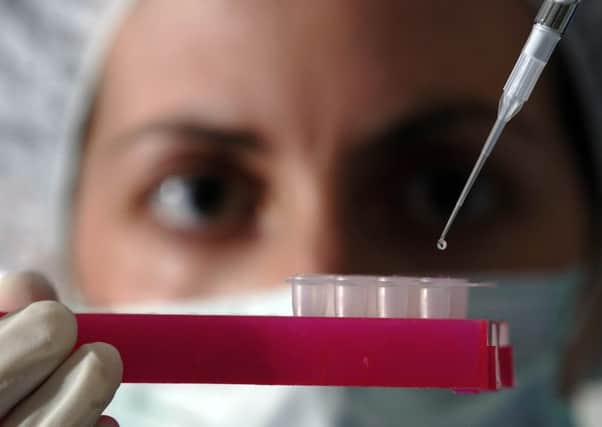Leaders: Lifetime lifeline may not be everyone's ideal


Predicting more accurately how long you are going to live is the tantalising prospect offered by new research at Edinburgh University.
Scientists have found tiny changes to DNA that could reduce one in 300 people’s lifespan by up to three years. They also discovered that two thirds of the population will inherit a DNA variant from a parent which could reduce their life span by up to a year.
Advertisement
Hide AdAdvertisement
Hide AdThe team have described their findings as the “tip of the iceberg” and say further work could significantly improve our understanding of how genes affect life expectancy.
The researchers believe this could produce health benefits, such as determining someone’s risk of developing conditions such as Alzheimer’s disease.
That could help improve knowledge about such diseases, which could in turn lead to better treatments being developed.
Dr Peter Joshi, who specialises at the university in the genomic basis of human lifespan, has said there must be many more DNA variants still to be discovered.
He hopes that could lead to far better knowledge of the “whole shape of lifespan”, including the role played by our genes.
So where’s this all going? Perhaps one day, doctors will be able to do a simple test which will tell us how long we have got left. That might be reassuring, even exciting, for some, but disturbing and bewildering for others.
Given a poor prognosis, what would you do? Rush out and start ticking off items on your bucket list? Or just continue sitting around, worrying yourself into an earlier grave?
Many of us would probably simply rather not know.
The problem is that while those found to be at higher risk of diseases like lung cancer might have some hope from being able to make lifestyle changes, like giving up smoking, there isn’t much you can do to prevent Alzheimer’s.
Advertisement
Hide AdAdvertisement
Hide AdThat is also the crucial point – as the scientists stressed.
They said that although the effect of genetic variants on lifespan is surprisingly large, lifestyle remained the single biggest factor.
So we can at least take some comfort from that – however accurate science will become in telling us how long until we die, we will still have a say in the matter.
That means there’s even more reason to modify our own behaviour, by taking simple steps that could not only extend our life expectancy but also improve quality of life.
We just need to think a bit more about what we eat, drink a little less, give up or drastically reduce smoking and take more exercise.
That could be as easy as by using our cars less or taking the stairs between floors rather than lifts and escalators, which is the equivalent of climbing a mountain a year.
It may still sound like science fiction, but one day we may know – genetically – how long a baby will live as soon as it is born.
All the more reason to keep hold of our own destiny with the factors still under our control.
Dignity in the face of devastation
Advertisement
Hide AdAdvertisement
Hide AdThe poignant and dignified tribute from the family of Glasgow shopkeeper Asad Shah yesterday belied the violence of his death.
They said the man they described as “everyone’s friend” had been taken away from them by an “incomprehensible act”.
Mr Shah’s relatives have spelt out what the hundreds of people who took part in vigils over the weekend must have been feeling.
They said he had met everyone with the utmost kindness and respect.
They said he was a brilliant man, who recognised the differences between people were vastly outweighed by their similarities.
But they also expressed no bitterness. One of our brightest lights has been extinguished, the family said, but our love for all mankind and hope for a better world in which all can all live in peace and harmony, as so emphatically embodied by Asad, will endure and prevail. The family’s grief has been mirrored by that of the community of Shawlands, where a fundraising campaign for Mr Shah’s relatives has already raised more than £105,000.
It was set up by four friends and regular customers of Mr Shah’s shop, who said his death had “devastated many”.
In turn, the family said it had taken consolation from the “spontaneous and deeply-moving response” of local people, which had moved them beyond words and helped them start the healing process sooner than they had thought possible.
Advertisement
Hide AdAdvertisement
Hide AdIt is another a shining example of a Scottish community pulling together at a time of crisis, as has happened so many times before.
Mr Shah’s family and local people together deserve the country’s admiration for the way they have reacted to such a shocking incident.